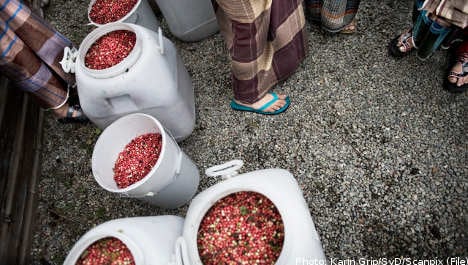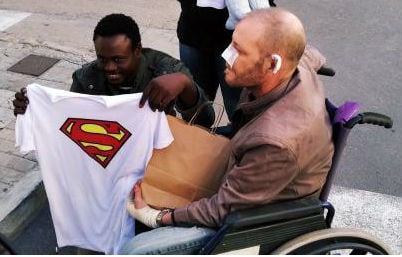A recent spike in violence and reports of poor working and living conditions of the migrant berry pickers have raised concerns among Swedes and brought the merit of the European Union’s labor policies into question.
According to migrant labour expert Mats Kullander of Oxford Research, a Stockholm-based think tank, the problem lies in the lack of employment contracts for EU migrant workers.
“EU citizens are no longer required to have an employment contract. That has been the most serious change in recent years,” he told The Local.
By contrast, berry pickers from outside the EU are only permitted to work in Sweden when they have a contract guaranteeing them a monthly wage as well as certain living expenses for the duration of their stay in Sweden.
Incidents of theft, assault and even allegations of human trafficking have arisen in recent weeks in the normally tranquil region around the city of Uppsala, some 70 kilometres north of Stockholm.
At an isolated campsite in the woods about two kilometers from Mehedeby, Turkish-speaking Bulgarians expressed their disappointment with what they have found in Sweden.
“Last year we got paid 25 kronor ($3.67) per kilo, this year it’s 12 kronor per kilo,” said one Bulgarian man from the Baltic Mountains who refused to give his name.
Wild blueberries sold by street vendors in Sweden typically sell in 150 gramme containers for about 25 kronor each. If bought by the kilo for 12 kronor each that would amount to a vendor’s profit of nearly 1,300 percent.
In addition to the low price for berries, the squalid conditions evident in the migrants’ camp are on par with that of a refugee camp.
The camp which houses about 100 Bulgarians, including children, had no toilets, showers, electricity, or sources of clean drinking water.
Violent incidents have also taken place including recent stone-throwing and brawling amongst the workers, leading to both arrests and hospitalizations.
Security is the main concern for Michael, a 25-year-old Bulgarian father of two living at the Mehedeby campsite. He claimed that some Swedes had been aggressive toward the migrant workers.
“We cannot feel safe because they were trying to attack us. I don’t know why, maybe they have some reason. Maybe they’ve seen someone stealing from them and have followed him here. I don’t know why,” he told The Local.
Last week approximately 200 Bulgarians were repatriated following an accusation of human trafficking and a subsequent sit-in by at least 100 Bulgarians at their country’s embassy in Stockholm.
“There were two people who came to the police and told us that they were here against their free will,” explained Lisa Sannervik of the Uppsala police to The Local.
“The police started an investigation and one person, a 43 year old man, was arrested. These three people involved have now left for Bulgaria.”
Solutions to the security, economic, and living condition problems of the migrants have not been easily ascertainable.
According to Michael, the situation would improve by having the Bulgarians register their addresses and license plate numbers with Swedish authorities.
“Next year I just want the community to give us some place where we can stay. Also, I want the police to record all the license plates of the cars of those living there,” he said, adding that such actions would make police reports simpler for any potential victims.
For Kullander, the next step is to acquire better information about the conditions of the migrant workers while also distributing information regarding the actual labor conditions in Sweden to would-be migrants still in Bulgaria.
“We have many questions unanswered. How many workers are in Sweden right now? Nobody knows exactly. Where do they come from? How much do they get paid, and so on. That issue has to be researched further,” he said.
“There needs to be better information for those people hoping to make an income explaining what the chances of that happening actually are.”
Jacob Sommer





 Please whitelist us to continue reading.
Please whitelist us to continue reading.
Member comments